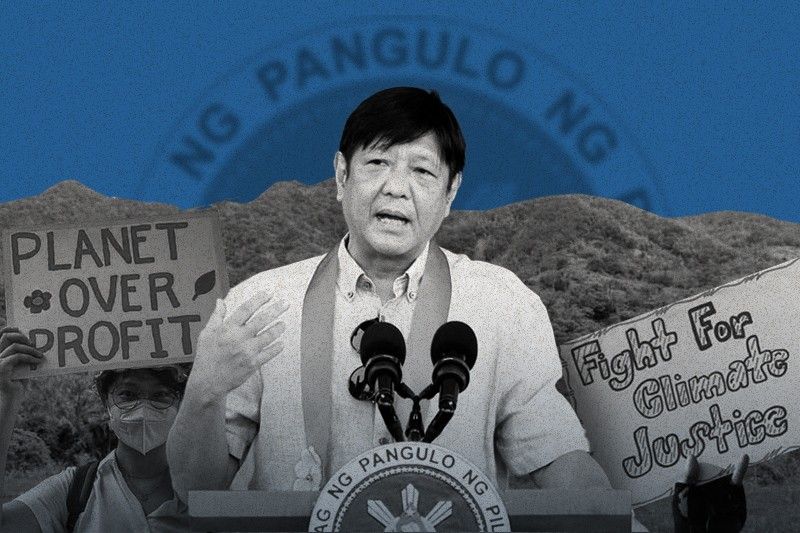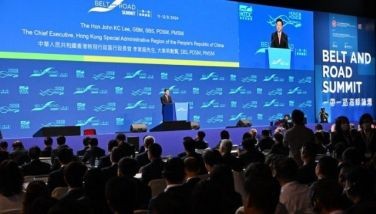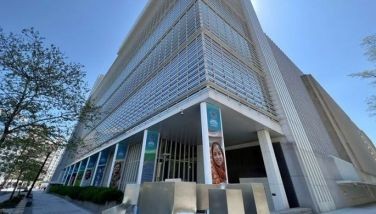In first 100 days, Marcos talks climate change but action still on back burner

MANILA, Philippines — President Ferdinand Marcos Jr. has frequently mentioned the need to address climate change in his speeches. He is, after all, leading the Philippines during the most crucial window to avoid or limit some of the worst effects of climate change.
In his first State of the Nation Address, Marcos said that increasing the use of renewable energy sources—a mitigation strategy—is at the top of his climate agenda, and mentioned the need to have investments in science and technology to help save lives.
Addressing world leaders present at the UN General Assembly in September, the chief executive stressed that “climate change is the greatest threat affecting our nations and our peoples.”
Like his predecessor Rodrigo Duterte, he called on developed nations to cut their greenhouse gas emissions and provide financial assistance to countries like the Philippines that bear the brunt of climate change impacts even though they are least responsible for the heating of the planet.
But for environment group Greenpeace Philippines, none of the president’s rhetoric has translated into meaningful action so far.
“If Greenpeace were to grade Mr. Marcos Jr.’s performance on climate in his first 100 days, he gets failing marks,” said Lea Guerrero, country director of Greenpeace Philippines.
"Just empty and misleading promises. All talk but zero action. We haven’t even seen a shadow of a climate plan, or even a hint of an actual directive."
Beyond rhetoric, how has the Marcos administration fared in terms of tackling climate change, and protecting the environment and its defenders?
Back-burner budget
Only two measures related to the climate agenda are included in Marcos’ priority legislative measures: the creation of the Department of Water Resources and the proposed National Land Use Act.
Under the National Expenditure Program, the proposed budget of the DENR for next year is P23.04 billion, which is lower than this year’s P25.45 billion.
Meanwhile, the Climate Change Commission’s 2023 budget is only P128.2 million. The amount is 8.42% lower than this year’s P140 million funding. CCC, which is chaired by the president, is the lead policymaking body on climate change.
“As indicative of its budget, it seems to be at the bottom of the president’s priorities,” Greenpeace noted.
The government, however, allotted P453 billion for climate change expenditures. Of the allocation, P265 billion will go to water sufficiency projects, while P169 billion will be earmarked for the flood management program of the Department of Works and Highways.
Non-profit IBON Foundation said this was an attempt of the Marcos administration to make themselves “green.”
Groups such as the Climate Reality Project Philippines are also calling for concrete policies and programs that will enable climate-smart agriculture and support farmers post-disaster. Super Typhoon Karding (Noru), the strongest typhoon to hit the country this year, battered the heavily agricultural region of Central Luzon in September.
Marcos also heads the Department of Agriculture.
Genuine transition or detour?
Marcos is pushing to adopt nuclear and develop fossil gas alongside renewables.
In his first SONA, Marcos called on Congress to enact a law seeking to foster the midstream natural gas industry “by diversifying the country’s primary sources of energy and promoting the role of natural gas as a complementary fuel to variable renewable energy.”
He also said “it is time to re-examine our strategy towards building nuclear power plants.”
Climate and clean energy campaigners said that nuclear and fossil gas will impede the genuine transition to renewable energy and threaten host communities.
“If the president is serious about providing the Filipino people access to clean, reliable, and affordable electricity, he will not direct investments on nuclear and fossil gas which will pose the same problems that coal is giving us right now,” said Nazrin Castro, branch manager of The Climate Reality Project Philippines.
Continued attacks vs environmental defenders
While Marcos likes to talk about climate change and environmental conservation, he is silent about the threats faced by Filipino climate advocates and environment defenders.
Last month, Masungi Georeserve Foundation reported the presence of armed men who encamped within the vicinity of its conservation site and allegedly planned to take over a huge portion of land in the protected area.
Groups also reported that individuals opposing the Ahunan pumped-storage hydropower plant project in Laguna and fisherfolk opposing reclamation projects were harassed.
The Philippines has been listed the deadliest country in Asia for land and environmental defenders for the ninth consecutive year, international organization Global Witness said in its latest report. Nineteen environmentalists were killed in the Philippines last year, making it the fourth deadliest country in the world.
High hopes for DENR chief
Green groups welcomed the appointment of Maria Antonio Yulo-Loyzaga as the secretary of the Department of Environment and Natural Resources. She headed the National Resilience Council and the scientific institution Manila Observatory.
Yulo-Loyzaga stressed the need for science-based governance, and for consultation and collaboration with stakeholders. Her priorities also include building resilient communities, implementing practical climate change adaptation measures, and enhancing the accounting of the country’s natural resources.
DENR recently held a multistakeholder forum attended by environmental groups, government officials, and even heads of big businesses.
“We have yet to see whether this will be a DENR that will put people and the planet before big business,” Greenpeace said.
Groups are urging Marcos and the new DENR leadership to take a stand against destructive reclamation and mining projects.
“[Marcos] has continued the business-as-usual approach of natural resources utilization under President Duterte. The mining operations and additional applications are abound with the lifting of the mining moratorium,” said Lia Alonzo, executive director of the Center for Environmental Concerns-Philippines.
What needs to be done
Greenpeace Philippines said the new administration should ensure that Marcos' actions are consistent with his rhetoric by doing the following:
- Institute climate action as the central policy of the state
- Put in place coherent strategies beyond disaster response
- Rapid and just transition to a low-carbon pathway
- Mandate businesses to align with the 1.5°Celsius commitment in the Paris Agreement
- Fully implement and strengthen the country’s environmental policies
- Support and protect environmental and rights defenders
“The climate crisis is more than just a social, political and economic issue. It is about our survival and existence. The Philippine government needs to ensure the survival and existence of all Filipinos,” the group said.
Read other explainers on Marcos' first 100 days:
- The first 100 days of Marcos: Where is our transportation heading?
- After series of resignations in first 100 days, are cracks emerging in Marcos’ unity?
- In first 100 days in office, Marcos rejects hopes for Philippines rejoining ICC
- Marcos' 1st 100 days: Still no health chief, eased mask rule
- In charts: The Philippine economy 100 days into Marcos presidency
- How Philippine stocks performed in Marcos' first 100 days
- Latest






























